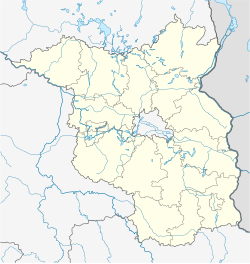You can help expand this article with text translated from the corresponding article in German. Click [show] for important translation instructions.
|
Casekow is a municipality in the Uckermark district, in Germany.
Casekow | |
|---|---|
 Train station | |
Location of Casekow within Uckermark district  | |
| Coordinates: 53°13′00″N 14°13′00″E / 53.2166667°N 14.2166667°E | |
| Country | Germany |
| State | Brandenburg |
| District | Uckermark |
| Municipal assoc. | Gartz (Oder) |
| Government | |
| • Mayor (2024–29) | Tino Kisicki[1] |
| Area | |
| • Total | 94.10 km2 (36.33 sq mi) |
| Elevation | 22 m (72 ft) |
| Population (2022-12-31)[2] | |
| • Total | 1,869 |
| • Density | 20/km2 (51/sq mi) |
| Time zone | UTC+01:00 (CET) |
| • Summer (DST) | UTC+02:00 (CEST) |
| Postal codes | 16306 |
| Dialling codes | 033331 |
| Vehicle registration | UM |
| Website | www.gartz.de |
Geography
editThe western border of the municipal area is formed by the river Randow, in the north the area of the small town of Penkun in Western Pomerania borders on Casekow. From the west the terrain rises from the Randowbruch over a forested terminal moraine (Blumberger Wald) by about 40 meters. Numerous small lakes and ponds lie in the depressions of the hilly area. The main village of Casekow lies on the Landgraben, which first flows northeast, turns southwest at Tantow and flows into the Westoder at Gartz (Oder). The nearest larger German town is Schwedt/Oder at a distance of about 20 km, the nearest larger Polish town is Szczecin.
Casekow is surrounded by the neighboring communities of Penkun to the north, Tantow and Gartz (Oder) to the northeast, Hohenselchow-Groß Pinnow to the east, Schwedt/Oder to the south, Zichow to the southwest, Gramzow to the west, and Randowtal to the northwest.
History
editFrom 1648 to 1720, Casekow was part of Swedish Pomerania. From 1720 to 1945, it was part of the Prussian Province of Pomerania, from 1945 to 1952 of the State of Mecklenburg-Vorpommern, from 1952 to 1990 of the Bezirk Frankfurt of East Germany and since 1990 of Brandenburg.
Demography
edit
|
|
|
References
edit- ^ Landkreis Uckermark Wahl der Bürgermeisterin / des Bürgermeisters. Retrieved 10 July 2024.
- ^ "Bevölkerungsentwicklung und Bevölkerungsstandim Land Brandenburg Dezember 2022" (PDF). Amt für Statistik Berlin-Brandenburg (in German). June 2023.
- ^ Detailed data sources are to be found in the Wikimedia Commons.Population Projection Brandenburg at Wikimedia Commons


